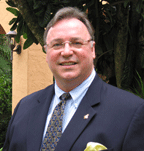A Message from the Exhibition Organizer
Since his appearance on the world stage, Napoléon Bonaparte (1769-1821) has been the object of intense public fascination. A brilliant military commander and visionary leader, he rose swiftly from obscurity to reign over a vast Empire…only to ultimately suffer crushing defeat, lonely exile and death on a remote and desolate island
With the 200th anniversary of Napoléon and Joséphine’s coronation as Emperor and Empress of the French on December 2nd, 2004, we entered a period of renewed interest in this fascinating period and its central figure.
In recognition of this bicentennial and that of the decade-long imperial reign, Pierre-Jean Chalençon granted permission for our firm to mount an exhibition of his extraordinary collection of art and objects from the period and his vast array of personal possessions of Napoléon and those closest to him. Though elements of the collection have been loaned for major exhibitions around the world, this is the first time these irreplaceable artifacts have been seen in our continent.
As the son of a long-time “Napoléon buff,” I grew up learning the story of this remarkable man. Through my father and my involvement with the Napoleonic Society of America, its publications, wonderful conferences and historic tours, I became an ardent enthusiast myself. The Society’s late founder Robert M. Snibbe, to whom we dedicate this exhibition, always dreamed of the Chalençon Collection touring North America, for he believed that once people were exposed to these rare and intimate objects from Napoléon’s personal world, they would be thirsty to learn more about him.
It is in that spirit that this exhibition has been developed. They say Napoléon ranks second only to Jesus as the subject of published biographies and papers, so we knew we couldn’t possibly cover all there is to know about the Emperor’s life and career. What we could do, though, was provoke our audience members to question what kind of man believes he can change the world and inspire them to learn more for themselves. We hope we’ve succeeded.
 Russell Etling
Russell Etling